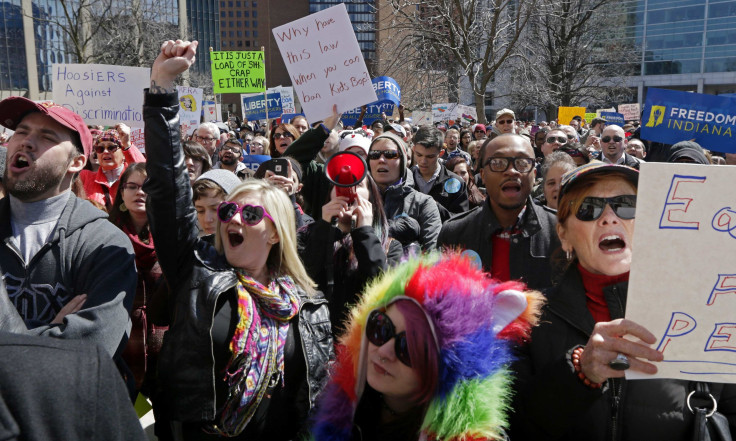Gay Wedding Economic Impact: Wedding Industry Embraces LGBT Ceremonies Amid 'Anti-LGBT' Laws

Christopher Confero, an Atlanta, Georgia, wedding and event planner, has never had any trouble lining up florists, caterers, venues or anything else a couple might need for a same-sex marriage celebration. “I know their hearts.” Confero, 30, said. “I can’t see anyone I’ve worked with turning away a couple.”
Amid an unfolding national debate on whether wedding vendors should be required to provide services to gay couples after the passage of so-called anti-gay laws in Indiana, Arkansas and other states, wedding planners across the country say the industry has largely embraced gay weddings and couples in recent years, as more than half the nation has legalized gay marriage. For many, the gay market represents a lucrative new pool of clients at a time when traditional marriages are on the decline. One estimate suggests gay weddings could be worth more than $2.5 billion for the wedding industry.
“The industry is more creative, more driven by women and gay men,” said Confero, a top-ranked wedding planner in the South who is also gay. “In this industry, it’s way more open, way more progressive.”
Proponents of religious freedom reformation acts such as the one passed in Indiana last month argue that business owners who oppose gay marriage shouldn't be required to serve same-sex weddings. A pizzeria owner in Indiana who said she would refuse service to a same-sex wedding raised $842,592 on GoFundMe, and a Washington state florist who denied service to a same-sex wedding collected $100,000 in recent days.
But gay weddings are an increasingly important market for the wedding industry. This year, same-sex marriage became legal in 37 states and Washington. A federal law allowing same-sex marriages would be worth at least $2.5 billion to local economies, a NerdWallet study estimated. The Williams Institute, which performs public policy and law research on sexual orientation and gender identity, similarly found that countrywide same-sex marriage legalization could be worth $2.6 billion total and $184.7 million in state and local tax revenue alone.
Kathryn Hamm, president of GayWeddings.com, works with wedding professionals across the country, her site’s vendor database 110,000 deep. A recent GayWeddings poll conducted with mainstream partner site Wedding Wire found that 86 percent of wedding professionals would work on a same-sex wedding, she said, adding that the number has been steadily rising.
A 2014 Pew poll found that 54 percent of Americans, along with 68 percent of millennials, support same-sex marriage. With more Americans endorsing gay civil rights, refusing to provide services to gay couples is simply a bad business move, Hamm said. She recently received an email from a straight bride-to-be asking whether the site's recommended vendors supported gay marriage. The woman didn't want to work with anyone who didn't, Hamm said.
Some wedding professionals have turned down business from gay clients in the past, usually because of religious reasons, Hamm said. But such refusals of service appear to be occurring less frequently, she said.
“Understanding the modern market means embracing everyone,” Hamm said.
On the whole, the wedding industry is worth $51 billion and employs 800,000 people, with the average wedding costing about $25,200, according to Cost of Wedding. But business has been less than certain in recent years, as the the marriage rate fell from 8.2 marriages per 1,000 people in 2000 to just 6.8 marriages per 1,000 people in 2010. In 2012, one in five adults age 25 or older had never been married, according to a Pew study. In 1960, that rate was only about one in 10.
For the wedding industry, LGBT ceremonies are an opportunity to make up for losses in other areas. Gay weddings are "not going to save your business," said Bernadette Smith, who owns an LGBT wedding planning firm in Massachusetts, the first state to legalize gay marriage in 2004. "But in such an expensive industry," she added, "an addition of one or two" weddings can be really helpful.
Smith's company, 14 Stories, also trains other wedding professionals to better cater to same-sex weddings, advising them to make simple shifts, such as changing the wording of a bride-focused brochure to be inclusive to all kinds of couples. In recent years, more businesses have sought to learn how to cater to the newly expanded marriage market, she said.
Lee Badgett, director of the Center for Public Policy and Administration at the University of Massachusetts, Amherst, and an economics professor who studies family policy issues and labor market discrimination based on sexual orientation, race and gender, said, "In the short run, there is that pent-up demand" that boosts the wedding industry when a state legalizes same-sex marriages. But more and more, same-sex weddings are becoming part of the social norm for the wedding industry, Badgett said.
“My sense is that there’s a point where the integration of this group of people into this old institution just happens,” she said.
© Copyright IBTimes 2024. All rights reserved.












